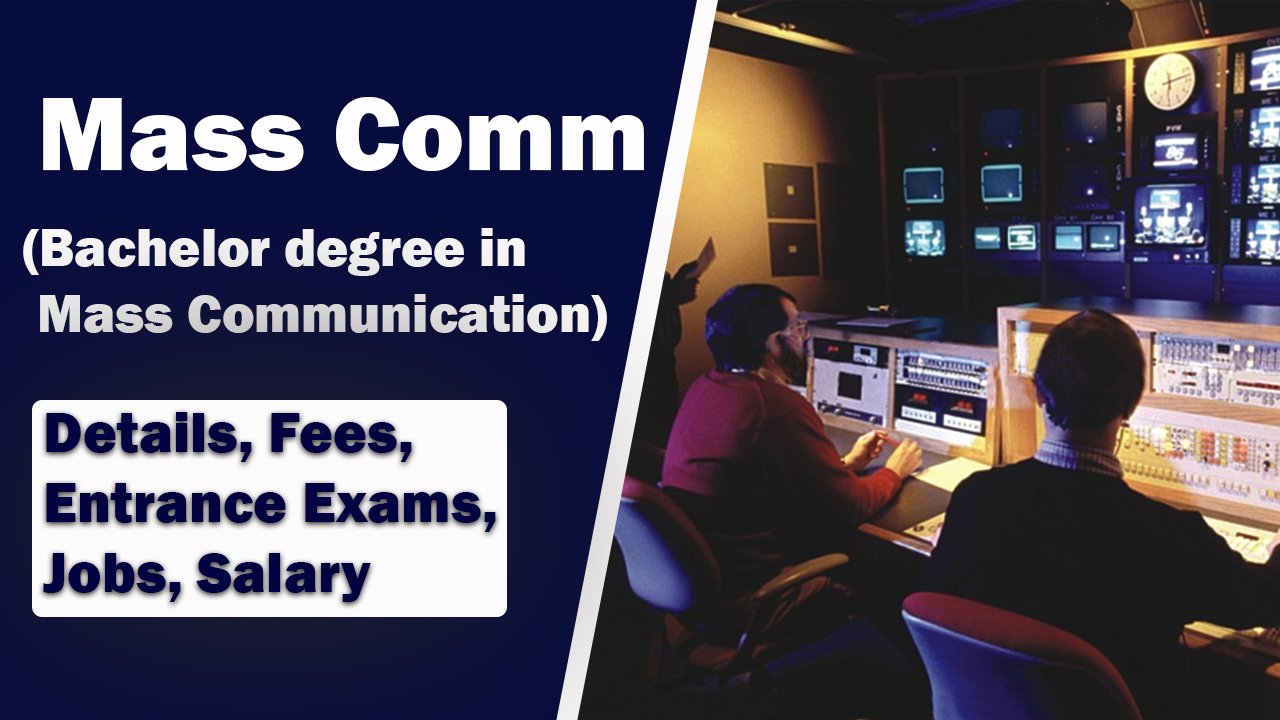Mass Comm(Bachelor degree in Mass Communication): Details, Fees, Entrance Exams, Jobs, Salary

Bachelor of Mass Communication (B.M.C.) is a popular undergraduate degree program designed for students who aspire to work in the media, journalism, public relations, advertising, and communication sectors. The program provides an in-depth understanding of various forms of media, communication strategies, journalism, content creation, and media production.
1. Course Overview
- Course Name: Bachelor of Mass Communication (B.M.C.) or Bachelor of Arts (B.A.) in Mass Communication
- Duration: 3 years (6 semesters)
- Type: Undergraduate Degree
- Eligibility: 10+2 from a recognized board in any stream with a minimum aggregate of 50%
- Specializations: Journalism, Advertising, Public Relations, Digital Media, Film Studies, Media Production
[elementor-template id=”123017″]
2. Eligibility Criteria for B.M.C.
To apply for a Bachelor’s in Mass Communication, candidates must meet the following eligibility criteria:
- Educational Qualification: Candidates must have completed 10+2 (or equivalent) from a recognized board.
- Minimum Marks: Most institutions require a minimum of 50% to 60% marks in Class 12.
- Stream: Students from any stream (Arts, Commerce, or Science) are eligible to apply.
- Entrance Exam: Some colleges and universities conduct entrance exams for admission, while others admit students based on merit.
3. Entrance Exams for B.M.C.
While many institutions offer merit-based admissions for B.M.C. programs, several reputed institutes conduct entrance exams to screen candidates. Here are some of the popular entrance exams for Mass Communication:
- IPU CET (Indraprastha University Common Entrance Test): Conducted by Guru Gobind Singh Indraprastha University for admission to B.M.C. programs.
- Jamia Millia Islamia Entrance Exam: Jamia Millia Islamia University holds an entrance exam for its B.M.C. program.
- Symbiosis Entrance Test (SET): Symbiosis International University conducts SET for admission to various undergraduate programs, including mass communication.
- Christ University Entrance Test: Admission to the B.M.C. program at Christ University, Bangalore is based on this entrance test.
- Xavier’s Entrance Test: St. Xavier’s College, Mumbai, conducts its own test for mass communication programs.
[elementor-template id=”123017″]
In addition to these, various state universities may have their own entrance exams for mass communication courses.
4. Fee Structure for B.M.C.
The fee for a Bachelor’s degree in Mass Communication depends on the type of institution (private or government) and its location. Here’s a general fee structure:
- Government Colleges: ₹30,000 to ₹1.5 Lakhs for the full course.
- Private Colleges: ₹2 Lakhs to ₹8 Lakhs for the full course.
Government institutions tend to offer B.M.C. programs at lower fees compared to private institutions.
5. Course Curriculum for B.M.C.
The Bachelor of Mass Communication program offers a combination of theoretical knowledge and practical experience, covering various aspects of media and communication. Here is an outline of the typical course structure:
- Introduction to Mass Communication: Understanding the fundamentals of communication and media.
- Journalism: Study of news reporting, writing, and editing.
- Advertising and Public Relations: Exploring strategies and practices of advertising, PR, and brand management.
- Digital Media: Introduction to online journalism, social media, and digital content creation.
- Media Laws and Ethics: Legal and ethical frameworks governing the media.
- Film Studies: Analysis of cinema, its evolution, and its impact on society.
- Radio and Television Production: Hands-on training in producing content for radio and television.
- Photography and Videography: Skills related to still photography, video production, and editing.
[elementor-template id=”123017″]
In the final year, students may also work on projects, internships, or dissertations that provide practical experience and a deeper understanding of the industry.
6. Specializations in B.M.C.
Many colleges allow students to specialize in specific areas within mass communication. Common specializations include:
- Journalism: Focuses on news reporting, investigative journalism, and editorial work.
- Public Relations: Deals with maintaining a positive image for organizations through communication strategies.
- Advertising: Teaches techniques of creating impactful advertisements and managing brand campaigns.
- Digital Media: Emphasizes content creation, blogging, vlogging, and social media strategies.
- Film and Television Production: Focuses on the creative and technical aspects of making films, TV shows, and documentaries.
7. Career Opportunities After B.M.C.
A Bachelor’s degree in Mass Communication opens up a wide range of career opportunities in the media, entertainment, advertising, and communication industries. Some of the common job profiles include:
a. Journalism
- Reporter/Correspondent: Work for newspapers, television channels, or online platforms to gather and report news.
- Editor/Sub-Editor: Responsible for editing and ensuring the quality of written content.
- News Anchor: Present news on television channels and online platforms.
- Photojournalist: Capture and report news stories through photographs.
[elementor-template id=”123017″]
b. Public Relations and Advertising
- Public Relations Officer: Manage communication between an organization and its audience, ensuring a positive public image.
- Advertising Executive: Develop advertising campaigns for brands and organizations.
- Media Planner: Plan and manage media strategies for advertisements.
- Brand Manager: Handle branding and marketing for products or companies.
c. Digital Media
- Content Writer/Blogger: Create engaging content for websites, blogs, and social media platforms.
- Social Media Manager: Manage social media presence and create content for platforms like Instagram, Twitter, Facebook, etc.
- SEO Specialist: Optimize content to increase traffic to websites and digital platforms.
- Digital Marketing Executive: Handle online marketing campaigns for businesses.
d. Film and Television
- Director/Producer: Oversee the production of films, TV shows, or documentaries.
- Scriptwriter: Write scripts for films, TV series, and web content.
- Cinematographer: Handle camera operations and visual storytelling in films and TV shows.
- Video Editor: Edit and post-produce video content for TV, films, or digital platforms.
e. Others
- Radio Jockey: Present radio programs, music shows, and talk shows on radio stations.
- Event Manager: Organize and manage events, including corporate events, festivals, and exhibitions.
- Corporate Communications Executive: Manage internal and external communications for organizations.
8. Salary After B.M.C.
The salary after completing a Bachelor’s in Mass Communication depends on the job role, employer, and location. Here’s a general salary range:
- Entry-Level Salary: ₹2 Lakhs to ₹5 Lakhs per annum.
- Mid-Level Salary: ₹5 Lakhs to ₹10 Lakhs per annum.
- Senior-Level Salary: ₹10 Lakhs to ₹20 Lakhs per annum.
Salaries in digital media, advertising, and PR sectors are often competitive, and professionals with strong communication and digital skills are in high demand.
9. Top Institutes Offering B.M.C. in India
Several prestigious institutes in India offer undergraduate programs in Mass Communication. Some of the top colleges are:
- Symbiosis Institute of Media and Communication, Pune
- Lady Shri Ram College for Women, Delhi University
- Christ University, Bangalore
- Jamia Millia Islamia, New Delhi
- Xavier Institute of Communications, Mumbai
- Indian Institute of Mass Communication (IIMC), New Delhi
- Amity School of Communication, Noida
- Manipal Institute of Communication, Manipal
- St. Xavier’s College, Mumbai
- Indraprastha University, Delhi
[elementor-template id=”123017″]
10. Conclusion
The Bachelor of Mass Communication (B.M.C.) degree offers a dynamic and versatile education for individuals who want to pursue careers in media, journalism, digital marketing, advertising, and public relations. With the rapid growth of digital platforms and media outlets, graduates have numerous opportunities to excel in creative and strategic communication roles. By gaining practical experience and developing strong communication skills, B.M.C. graduates are well-prepared to thrive in the fast-evolving media industry.
ALSO READ
- JEE Main 2024 result today, over 12 lakh students await results
- JEE Main 2024 City Intimation Slip LIVE: JEE Mains session 1 admit card at jeemain.nta.ac.in soon
- JEE Main 2024: Image correction facility ends today at jeemain.nta.ac.in; required specifications
- JEE Main 2024: NIT cut-offs for BTech in Chemical Engineering
- JEE Main 2024 NIT cut-offs for B.Tech Electronics and Communication Engineering
- JEE Main 2024 Form Correction STARTED: Catch Live Updates Here
- JEE Main 2024 correction window opens tomorrow at jeemain.nta.ac.in; photo specifications
- JEE Main 2024 session 1 registration ends today at jeemain.nta.ac.in; exam pattern
- JEE Main 2024: Exam Dates OUT, Application Form, Syllabus, Eligibility, Preparation, Exam Pattern, and More






